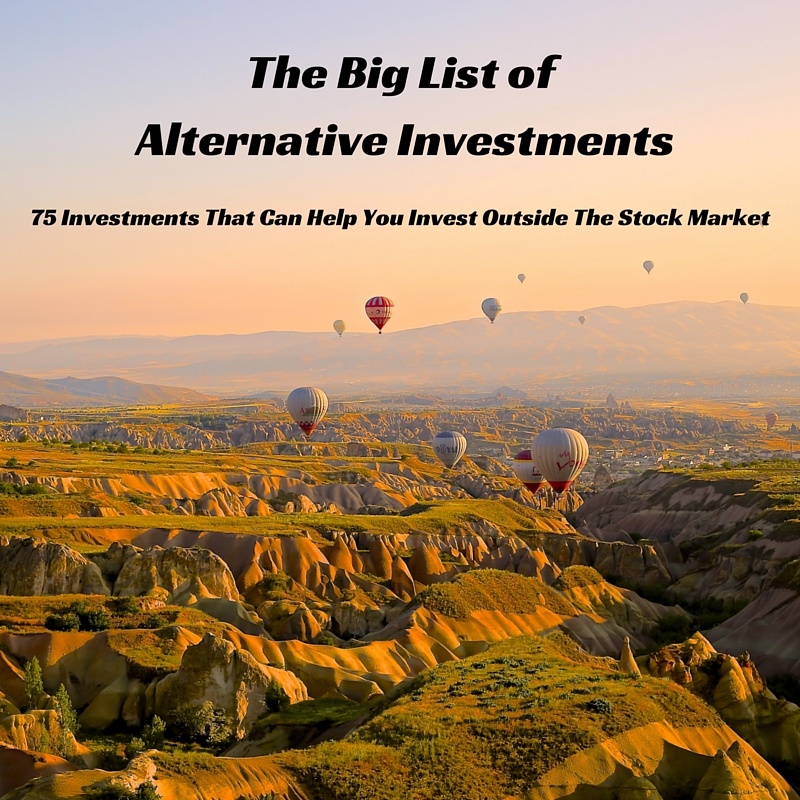A few weeks ago I wrote about 10 alternative investments that you have never heard of. I got so much positive response from it, that I decided to add to it by creating the Big List of 75 Alternative Investments so investors could have more options to diversify their portfolio. This is available as a special report here.
In 2008, many people lost money by investing in the stock markets around the world. There was a cascade of events that caused people to flee the markets in favor of cash, safe bonds and other assets such as gold.
More than 7 years later, this fear has stayed in many investors’ psyche due to the massive losses that they took on their stock portfolios during that difficult period of time. It is hard to forget such a traumatic experience. Some investors were only a few years from retirement and they lost 50% of their money. What if the stock market had not come back so sharply? Worse yet, what if the investors sold at the bottom and stayed in cash?
More importantly, how could this have been avoided?
For starters, investing wisely means knowing what you are investing in. Peter Lynch said it best when he said, “Invest in what you know.” This holds true for any investment. You should know what you are investing in before you put your money at risk. Don’t invest in “trendy” investments just because your neighbor is doing it. Investing is challenging enough, stick to what you are good at.
Second, investors should know when to hold em’ and know when to fold em’. The buy and hold investing mentality is a great long-term investment strategy if you invest in the right companies, and the economy continues to grow. However, even if you are invested correctly, you might have still lost money in 2008. So it is important to know when to sell. Always have an exit strategy to preserve your capital.
Third, investors should diversify their portfolio both inside and outside the stock market. Proper diversification requires that you invest in assets that are not correlated to each other. What better way to find low or negative correlation assets than by looking outside the stock market for new investments?
Lastly, where does it say that you must invest in the stock market to make money? There is no requirement that you need to have a brokerage account. There are virtually an unlimited amount of investment opportunities to choose from, why focus on just one? Open your mind to the world of opportunities that sits in front of you every day.
Invest in what you know with alternative investments
There has been a strong trend in the past decade of investors looking to invest outside the stock market. This is partially due to the uncertainties and lack of faith in publicly traded securities and the markets themselves. But more importantly, this trend is in large part due to investors looking to find uncorrelated assets that do not rely on the stock market for performance. For over 15 years, large institutions such as Harvard University, Yale and CALPERs, have invested in alternative investments. As of 2014 Harvard University’s endowment had over 50% of the funds invested outside the stock market into alternative investments 1.
There are a number of reasons to invest in alternative investments, but the question you are probably asking yourself is…
What should I invest in?
This is probably one of the most common questions we get asked by investors.
We decided to write this piece to address some of those questions. This is The Big List of 75 Alternative Investments. Each of these investments has sub-categories within it that investors can explore as well. I’m sure I missed a few since the world is a big place, but if you know of or have investments that are not on this list, please write in the comments or contact us and I will add them to this list.
Self-Direct Your Retirement with Alternative Investments
Another of the common questions we here is…
What can I invest in with my self-directed IRA?
For investors who have saved money in their retirement accounts, you have the option of using your self-directed IRA or 401k for most of these investments listed below. There are a few investments on this list that are not allowed in retirement accounts, but only a few. For reference, the investments which are prohibited from being held in an IRA are, S-corps, life insurance, and collectibles.
Please enjoy this list. I hope you find an investment that suits you so that you can do further research into it. If you want to invest in alternative investments and you feel you need help from a professional, you can contact us to learn more about our services.
The Big List of Alternative Investments
- Residential Real Estate
- Commercial Real Estate
- Industrial real estate
- Tax Liens
- Private mortgages
- Flipping houses
- Lease options on real estate
- Farmland
- Timberland
- Storage units
- Water rights
- Fishing rights
- Airspace rights
- Mineral rights
- Cell Tower Leases
- Horses
- Livestock
- Municipal liens
- Film Tax Credits
- Private company stock
- Oil & Gas LPs
- Franchises
- Network marketing
- Accounts receivable financing ( factoring)
- Royalties
- Fixed Annuities or Equity-indexed annuities
- Publicly traded stock options
- Warrants
- Options on stock
- Preferred stock
- Insurance Structured settlements
- Airplane leasing
- Collectibles
- Precious metals (Gold, Silver, Platinum, Palladium)
- Cash
- Diamonds
- Clean energy tax credits
- FOREX
- FOREX options
- Futures / Commodities speculation
- Futures options
- Peer-to-peer lending
- Virtual currency or crypto-currency
- Municipal bonds
- Infrastructure bonds
- Infrastructure investments
- Master Limited Partnerships (MLP)
- Real Estate Investment Trust (REIT)
- Derivatives
- Wine
- Private Equity
- Venture Capital
- Private Placements
- Startup angel investing
- Intellectual property
- Lottery Structured settlements
- Artwork
- Equipment leasing
- Hedge funds
- Housing Tax credits
- Payday loans
- Title loans
- Parking lots
- Distressed securities
- Websites / URLs
- Variable Annuities
- Small Business Lending
- Classic Antique Cars
- Business Development Companies (BDC)
- Raw Land
- Insurance viatical settlements
- Structured products
- Coins
- Stamps
- Limited Partnership
I hope you were able to find an investment on this list that piqued your interest. If you want to learn more about each of these alternative investments, you can read more at Innovative Advisory Group, or by following our blog.
If you want to sign up for our email list, you will get an enhanced version of this report in a PDF format. This enhanced version will briefly discuss each investment. You will also receive our other special reports based on topics you express an interest in.
Alternative Investment Resources:
- Alternative Investments
- Top 10 Ways Wealthy Families Protect and Grow Their Wealth
- These Top 7 Powerful Tools Can Create Legacy Wealth From Real Estate
References:
- Harvard Management Company, 2015 annual report
About Innovative Advisory Group: Innovative Advisory Group, LLC (IAG), an independent Registered Investment Advisory Firm, is bringing innovation to the wealth management industry by combining both traditional and alternative investments. IAG is unique in that they have an extensive understanding of the regulatory and financial considerations involved with alternative investments held in self-directed IRAs and other retirement accounts. IAG advises clients on traditional investments, such as stocks, bonds, and mutual funds, as well as advising clients on alternative investments. IAG has a value-oriented approach to investing, which integrates specialized investment experience with extensive resources.
For more information, you can visit Innovative Advisory Group
About the author: Kirk Chisholm is a Wealth Manager and Principal at Innovative Advisory Group. His roles at IAG are co-chair of the Investment Committee and Head of the Traditional Investment Risk Management Group. His background and areas of focus are portfolio management and investment analysis in both the traditional and alternative investment markets. He received a BA degree in Economics from Trinity College in Hartford, CT.
Disclaimer: This article is intended solely for informational purposes only, and in no manner intended to solicit any product or service. The opinions in this article are exclusively of the author(s) and may or may not reflect all those who are employed, either directly or indirectly or affiliated with Innovative Advisory Group, LLC.


